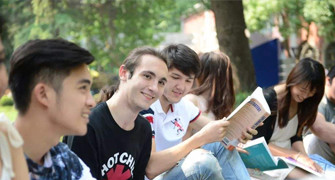Professor Zhang Yansheng delivered a speech on "How to make Wuhan the fourth pole to promote China's economic development after the outbreak". Zhang yansheng said that the outbreak is a world war between the virus and mankind. The epidemic situation in China, especially in Wuhan, has entered the second stage, namely the stage of risk point management. The next step is to do a good job in fighting the epidemic, resuming work and ensuring people's livelihood, so as to normalize cultural life. Wuhan needs to fully grasp the advantages of being at the center of the domestic market, fully connect with each other, stabilize supply chain and industrial chain, and promote the modernization of its governance system and governance capacity.We should give full play to our advantages, become the fulcrum of innovation driving in the new era, and drive the development of the central region with points and areas. Wuhan itself has unique advantages in emerging industries such as medicine, old-age health, tourism and leisure. We hope That Wuhan will continue to make persistent efforts to promote high-quality development by comparing itself with Tokyo metropolitan area, New York Greater Bay Area and Silicon Valley. It is expected that wuhan will build a first-class environment and support system, a first-class innovation chain and a first-class public innovation platform after the end of the epidemic, become a gathering place for science, technology and talent innovation, and create a new economic source.
Professor Zhao Changwen said that the epidemic has always been an important variable and parameter in the history of human development, and there are numerous cases of viruses and epidemics affecting the historical development of human society. The impact of the COVID-19 on the national economy, especially the economy of Wuhan has been extensive and lasting. Both the domestic supply side and the foreign demand side were affected. The epidemic had a more direct impact on supply chains and industrial chains, leading to a decline in demand for services. And the uncoordinated resumption of work and production may also lead to the whole production capacity. On the other hand, the epidemic was like a stress test for the industry. It also brought many opportunities, such as new forms of digital technology, telemedicine and online education. Hubei and Wuhan in the future should make greater efforts to promote openness, promote innovation, expand the scope of resource allocation, solve the lack of key core technologies, further stabilize enterprises and ensure employment.
According to Professor Mao Zhenhua, the development of the epidemic situation was far beyond our imagination. It seemed that the whole world needed to press the "pause" button. China had its own experience in dealing with similar problems, and we needed to have full confidence in our own system and ability to deal with them. Future prevention and control measures should not be taken lightly, and the risk of secondary transmission should be kept on high alert. Professor MAO Zhenhua stressed that panic was not a danger, but a lack of awareness of the epidemic was a danger, "panic is the best medicine of the epidemic". The future epidemic prevention work should be treated with higher requirements. At the same time, epidemic prevention and economic development are the two bottom lines. In terms of epidemic prevention, Hubei province can focus on testing in the next stage. It should be inspected as soon as possible and is willing to do so. In terms of economic development, we needed to further stabilize employment and consumption. It is suggested that citizens be issued with consumption vouchers to compensate people in Hubei province for their expenses. In the interaction with scholars, Professor MAO Zhenhua putted forward some views on the development of healthy economic industry. In his opinion, in the short term, there was a great demand for medical products and elimination products, while in the long term there was an inventory problem. It is suggested to establish national reserve center and bring it into national strategic reserve. We should respond to possible changes in the consumption structure and vigorously develop a healthy economy.
In his speech, Professor Guan tao said that China's economy and hubei's development under the impact of the epidemic should pay attention to avoiding structural unemployment, make the proactive fiscal policy more effective, step up macroeconomic adjustment and implementation, appropriately increase the fiscal deficit to GDP ratio and increase public consumption. At present, we have achieved initial success in the fight against COVID-19, but the spillover effect of the overseas epidemic will also affect our resumption of work and production, and the impact will persist in the second half. Employment concerns the basic livelihood of the people, and we will vigorously implement the policy of giving priority to employment. Our traditional strength is to continue to optimize and upgrade our industrial structure, and the proportion of employment in the tertiary industry continues to rise. And as the last crisis response showed, more investment could stifle job creation. At present, all countries have adopted a package of policies to deal with the epidemic. Take the US as an example, the us $2 trillion fiscal response plan is more like an economic hedging plan. The development of China's economy and Hubei province should grasp the key to stable employment and put the limited financial resources to good use.
Professor Zhang Jianhua delivered a speech on the topic of "Judging China's economy and the future trend of Hubei Province, and what Hubei and Wuhan should do". He pointed out that since March, the international pandemic has turned the black swan event into the grey rhino event, which is a serious situation and a potential new crisis has increased. Changes at the epidemic level affect people's emotions and reflect financial and practical needs. Over time, short-term adverse effects are likely to solidify over the long term, with many agencies revising down their growth forecasts. But the economy still has the fundamentals of long-term improvement, and the trend of improvement is increasing. We need to restore confidence, turn the spirit of fighting the epidemic and being a heroic city into a driving force for economic development, and seize development opportunities. We will make full use of the nationwide inclusive and targeted preferential policies and make full use of them. This year is the launch year of the 14th five-year Plan, which can transform many of our ideas. We need to make up for weak links, especially in public health. We need to turn our advantages in science and education, geographical location and transportation into real ones, and speed up economic transformation and development.
Professor Luo Zhi delivered a speech on the theme of "Enabling Enterprises to survive the crisis". Based on the investigation and analysis of hubei enterprises, she pointed out that COVID-19 has brought great economic downside risk to Hubei's development. Based on the two rounds of research, Professor Luo pointed out that enterprises in Hubei province have been far more affected by the epidemic than those in other regions, and the implementation of preferential policies is still not in place. Enterprises in Hubei province are facing multiple difficulties, such as capital shortage, rising costs and market being seized. Luo estimated the GDP losses in Hubei and Wuhan and analyzed the potential wave of bankruptcies, unemployment and capital withdrawals of small and medium-sized enterprises. She also pointed out that judging from the SARS experience, the economy should not expect retaliatory growth in the future. Compared with the huge support for enterprises in major developed countries, Professor Luo zhi pointed out whether China's judgment on the impact of the epidemic on private enterprises was too optimistic. The current policy priority is to keep private enterprises alive so that the economy can truly restart. The government needs to offer interest to enterprises and residents substantially and increase the cash flow of small and medium-sized enterprises through policy-based financial institutions. It is suggested that Hubei province should apply for the establishment of "pilot zone for private economic reform" and take a new road for the development of private economy.
Professor Song Min said in his speech that the impact of this crisis is very big and long-term. It is not only a once-in-a-century crisis, but also a crisis in the context of globalization. If a third wave of crises were to occur in developing countries, the impact on China's economy would be even greater. At present, the two fronts of fighting the epidemic and economic development should not be too biased and should be appropriately balanced. "To fight against the epidemic is to save lives, so is the economy." When the economy develops well, the death rate will decrease. Scientific epidemic prevention should be carried out through big data technology to accurately track the number of confirmed cases and contact groups. We need to broaden the policy framework, instead of adopting simple stimulus and counter-cyclical policies, we need to strengthen global coordination and hedging. In the United Kingdom, for example, the government paid 80 percent of the wages of enterprise workers in order to maintain the survival of the enterprise. Because once a business fails, it is very unlikely to reopen. There must be innovation in policies to help smes solve their loan problems. At present, the people of Hubei and Wuhan should have the biggest driving force for reform in China. It is hoped that through the appeal of experts, reform will be timely promoted, innovation will be made in the areas of hierarchical diagnosis and treatment, digital economy, digital education and digital government affairs, and reform of administrative system will be timely promoted.
During the exchange and discussion, experts had in-depth exchanges on issues raised by participants, such as anti-globalization, global value chain and the development of China's health economics.
Around 300 experts and scholars from different universities participated in this meeting, and the participants made high comments on the quality and effect of the meeting.(Rewritten by Lai Xiaowei,Edited by Luo Yu Zhang Yixin)
 Faculty and Staff
Faculty and Staff Academics
Academics International Exchange
International Exchange







